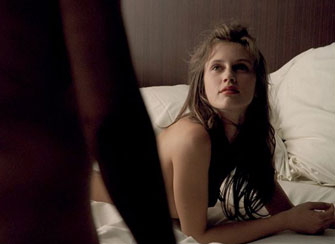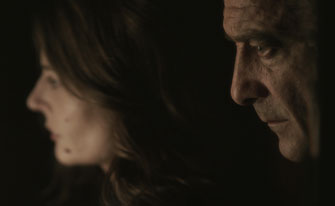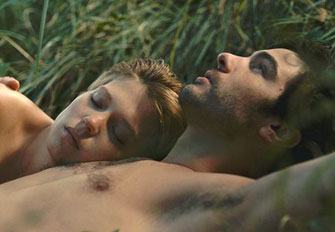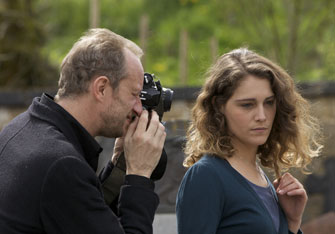Love, Sex and Prostitution, But Few Belly Laughs

After a summer of dull offerings, the French movie industry has brought out the big guns for the rentrée (post-holiday period), and while none of the four new offerings reviewed below squarely hits the bull’s-eye of sublime filmmaking, some of them come close. Don’t expect many laughs in these overwhelmingly serious subjects, however.
The prolific François Ozon’s latest film, Jeune et Jolie (Young & Beautiful), opens with a scene that cleverly foreshadows what is to come. Through the lenses of a pair of binoculars, we see a beautiful teenaged girl stretched out topless on the beach. Cut to the beach: a menacing shadow falls over her body. The audience laughs with relief – a bit too soon – when the supposed stalker turns out to be her younger brother, Victor.
Isabelle (Marine Vacth) and Victor (Fantin Ravat) are part of a warm, loving family surrounded by good friends, which makes the secret life as a high-paid prostitute she undertakes back at home (after having her first sexual experience during the summer) all the more difficult to understand. Deftly made, this impressive film handles its delicate subject matter with great subtlety. Ozon has come a long way since his popular but rather maladroit 2002 musical 8 Femmes (8 Women).

Prostitution and the sexuality of an adolescent girl are also at the center of Claire Denis’s Les Salauds (Bastards). This is a dark film, both literately and figuratively. Or perhaps “murky” would be a better word. Bright light – whether natural or artificial – doesn’t exist in this world, in which many scenes fade to total blackness, obscuring the action and leaving the audience clueless as to what is going on.
The movie stars Vincent Lindon as Marco, a brooding ship’s captain who is called back from sea when his brother-in-law and best friend commits suicide. The story unfolds slowly, very slowly. In the opening scene, for example, we see a baldheaded man watching the pouring rain outside an office window for what seems like a full five minutes. One might be forgiven for thinking that he plays an important role in the film, but he doesn’t reappear until the very end (very briefly).
Next up is the recurring image of a young woman walking naked through the dark streets of Paris like a zombie, a state that is echoed by Lindon’s costar, Chiara Mastroianni, who remains mostly expressionless as she plays Raphaëlle, the wife of a powerful and probably corrupt business tycoon. The naked young woman turns out to be Marco’s niece, who has been sexually abused by her father and now seems to be on drugs and in the claws of some kind of prostitution ring. The two stories merge as Marco investigates his niece’s disappearance.
The power of this impressionistic film gets lost in muddled storytelling and unlikely coincidences. The audience is given bits and pieces of information and has to try to piece them together, while the interesting but intrusive music dictates the required emotions and sometimes even gives away what is about to happen. One of the best things about the film is its ending, which seems surprising and unlikely at first but upon reflection makes good sense.

In Grand Central, directed by Rebecca Zlotowski, luscious Karole (Léa Seydoux), in a short haircut and even shorter hot pants, carries out a torrid affair with shy but sexy Gary (Tahar Rahim) against the backdrop of the nuclear power plant in France where they work.
Danger lurks in both realms: Karole is engaged to Toni (Denis Ménochetoth), Gary’s friend and protector, and the two men are part of the team doing the dirty work in the reactor’s inner core, where they are in constant danger of radioactive contamination. The tension builds as the three main characters and their mates work and play together, the bucolic setting of the compound where they all live contrasting starkly with the sterile, hostile and oppressively controlled environment they work in.
As in real life, no one comes out completely clean in this interesting look at a claustrophobic world most of us would rather not know about.

Une Place sur la Terre (A Place on Earth), directed by Fabienne Godet (that makes three out of four films in this review directed by a woman!), stars the excellent Benoît Poelvoorde as Antoine, a talented photographer who has pretty much dropped out of life and spends most of his time drinking whisky and hanging out with a little boy, his “best friend” and neighbor, Matéo, the riveting Max Baissette de Malglaive (we can’t take our eyes off his big, expressive eyes), whose mysteriously absent single mother seems to have more or less abandoned him to Antoine’s dubious caretaking.
Antoine becomes obsessed with his piano-playing neighbor, Elena (Ariane Labed), an ethereal beauty, and begins surreptitiously taking pictures of her through the window. Following her with his camera, he photographs what appears to be a suicide attempt but may be an accident. He visits her in the hospital and gradually worms his way into her life despite her initial resistance. Antoine, Elena and Matéo become a happy threesome for a while, until she discovers he has been stalking her with his camera.
With its echoes of Antonioni’s Blow-Up, this film is above all an affecting, well-acted character study of three lonely souls trying to find their place in the world, as the title spells out for us.
Reader Margo Berdeshevsky writes: “Admittedly, I have only seen the first on your list thus far, Jeune et Jolie. Well, that is to say I saw it until I walked out after an hour of soft porn with no insight as to the psychology that might inspire its nubile starlet to her life of sullen sexuality. But I will jump in here and say that no, on this one at least, the film is neither clever nor even close to any bull’s eye. It is close to the tedium of a young woman seemingly astride her own steed to unloving sexuality, while her bourgeois nice family remains deaf, dumb and blind, at least for a lengthy first hour. The film poster advertises ‘inappropriate for under 13.’ Hmmm. Not much appropriate there for 14 or 40. Hélas. I think I’d much rather go back and see a rerun of Belle du Jour to contemplate a woman’s desire for exploration in the afternoon.”
Heidi Ellison replies: “If you had stayed to the end, you would have seen that there was a reaction from the family as well as a sort of explanation, which thankfully was not too explicit but that had the ring of truth to it. Of course, Belle du Jour is a better film – a real work of art – but I thought this was an interesting exploration of a confounding subject.”
Reader Margo Berdeshevsky writes: “I think the short film that can be seen at http://lesjeunespourlabolition.fr is essential viewing, particularly in view of my own response and that of others to the film Jeune et Jolie.”
Favorite
